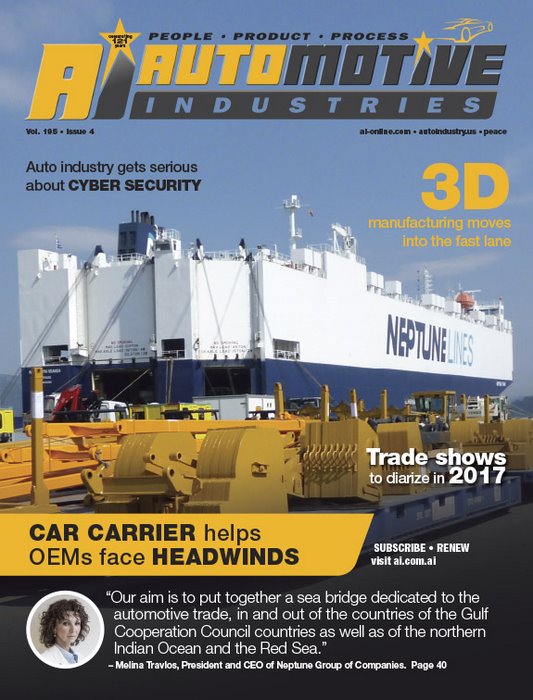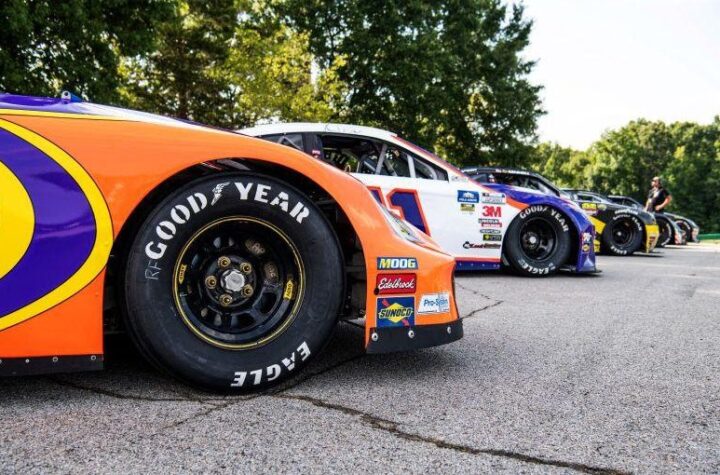
Vehicle logistics suppliers are expanding and adapting their services to provide OEMs with the flexibility to adjust quickly to ongoing shifts in global markets and buying patterns.
An example is the introduction of a short sea shipping service for the Arabian Gulf by Neptune Lines. The regular, two-loop service, interchanging weekly, connects eight countries in the Gulf (United Arab Emirates, Iran, Iraq, Saudi Arabia, Kuwait, Oman, Qatar, Bahrain).
Neptune Lines was founded in 1975 by Nicolas Travlos as a cargo and ship handling services company. It went on to expand its services to operate across the Mediterranean and Black Seas. Today the business is a leading independent finished vehicle logistics provider, offering transportation and shipping solutions to the world’s largest automotive manufacturers and shippers of high and heavy cargoes, as well as major logistics providers. The company has a modern fleet of Pure Car & Truck Carrier (PCTC) vessels and a large agency network.
This set up, combined with its operational expertise, means that the company can provide flexible, tailor-made solutions to more than 20 countries and 30 key ports, focusing on the Mediterranean and Black Sea. In 2015, the company transported almost a million units for its customers. The company was also recognised as the offering transportation and shipping solutions to the world’s largest automotive manufacturers and shippers of high and heavy cargoes, as well as major logistics providers. The company has a modern fleet of Pure Car & Truck Carrier (PCTC) vessels and a large agency network.
This set up, combined with its operational expertise, means that the company can provide flexible, tailor-made solutions to more than 20 countries and 30 key ports, focusing on the Mediterranean and Black Sea. In 2015, the company transported almost a million units for its customers. The company was also recognised as the Dry Cargo Company of the year in Lloyds List Greek Shipping Awards, among other accolades from its customers.
Automotive Industries (AI) asked Melina Travlos, President and CEO of the Neptune Group of Companies, what changes in volumes the company was seeing.
Travlos: After a record year in 2015 we saw a slower than expected start in 2016, although it has picked up in the middle of the year. The low oil price environment has negatively affected our business since some of the countries in our region, namely Algeria and Russia, are net oil exporters and their economies came under pressure. This, combined with increasing political tension in Russia, for example, has resulted in a prolonged recession of that market.
AI: What has been your response to these developments?
Travlos: The fall in global oil prices as mentioned above, coupled with the overall volatility in our core markets made us quickly realize that in order to remain on target, we have to adapt our business strategy. We have grown our business geographically by finding other markets like a recent network expansion to the Arabian Gulf, and we are also currently studying India, Pakistan and the countries surrounding the Red Sea. We are also exploring other cargo segments, like high and heavy or project cargo, where traditionally we were not as focused. Thanks to these commercial efforts we are still on track to move one million vehicles this year.
AI: And how does it compare to your PCTC division?
Travlos: The overall industry is facing headwinds as the new vessel deliveries coupled with historically low fuel cost have translated into increased shipping capacity. We have seen some scrapping of older vessels, but not nearly enough to address the oversupply we face. Coupled with the poor performance of certain markets and cargo types and the increasing reliance on a limited number of core trades, competition has intensified further and a lot of our peers have come under pressure. We have been fortunate to rely on a diversified mix of markets, clients and cargo and our business model has proven resilient, but obviously we are not immune to market developments.
AI: This year marks the opening of a new short sea shipping service for Neptune Lines in the Arabian Gulf. What is your experience so far?
Travlos: For a number of reasons, the automotive market in the Arabian Gulf is an exciting market and presents opportunities for growth. With the inauguration of our new service, our aim is to put together a sea bridge dedicated to the automotive trade, in and out of the countries of the Gulf Cooperation Council countries as well as of the northern Indian Ocean and the Red Sea. We are also there to offer local feeder services to the deep sea carriers.
Our experience so far is that a vessel of the capacity of Neptune Ploes currently serving the area, along with the quality of transportation services that our company traditionally offers, was something needed in the region. Once the Neptune Ploes reaches its full capacity we will deploy a bigger vessel.
AI: What plans do you have for expanding your fleet?
Travlos: We operate a young and modern fleet with ships of diverse size and capacity, with a total carrying capacity of 45,000 units. In the last two years we have added four new vessels in our owned tonnage. Our fleet is 94% owned vs an industry average of 49%. Our technical and newbuilding division keeps continually up to date with all the current developments in search of further improvements in cost efficiency, enhanced environmental friendliness and new ships’ designs.
We are always in discussions with the shipbuilders, and are also exploring the increased opportunities that exist nowadays for chartered tonnage. We are currently evaluating the market in terms of size and vessel specifications, bearing in mind at all times the changes in fuel prices. We are always very meticulous before making an investment choice, and these days, more than ever, any further investment need to be carefully planned, calculated and evaluated.
AI: What are your predictions for the growth in the automotive industry for the next couple of years, and how will this impact Neptune Lines?
Travlos: According to current trends, the car industry is expected to grow from 2018 onwards, but at a slower pace than over the last few years. The global economy is still waiting for a strong recovery after 2008’s financial crisis, the European market is facing difficulties, and the Brexit vote is a further destabilising factor. All this, together with the turbulent environment in regional markets and the subsequent spill over on a global level, has put a lot of uncertainty to all car sales forecasts. Not to mention that each region offers different pathways for growth due to its differences in demographics and economic prospects.
In this context our predictions cannot but be conservative. In the competitive and challenging car carrier market, innovation and the ability to adapt is the key. Neptune Lines has entered the fifth decade of its operation, always keeping an eye on global developments, and with the vision to be pioneering both in our services, as well as in the markets served. This spirit of adaptation and exploration is our driving force which, along with our commitment to excellence, has kept us growing stronger and bigger despite the challenges and the volatility of the market











More Stories
Automotive Industries (AI) Newsletter April 2025
How to Create the Ultimate Off-Road Vehicle Garage: A Practical Guide
5 Fleet Tracking Metrics Every Manager Should Be Monitoring